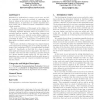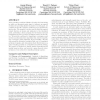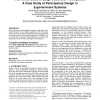71 search results - page 13 / 15 » Theory of Rumour Spreading in Complex Social Networks |
CSCW
2006
ACM
13 years 11 months ago
2006
ACM
Groupware communicates by sending messages across the network, and groupware programmers use a variety of formats for these messages, such as XML, plain text, or serialized object...
PODC
2006
ACM
13 years 11 months ago
2006
ACM
Motivated by applications to sensor, peer-to-peer, and adhoc networks, we study the problem of computing functions of values at the nodes in a network in a totally distributed man...
SIGECOM
2009
ACM
14 years 7 days ago
2009
ACM
Policy teaching considers a Markov Decision Process setting in which an interested party aims to influence an agent’s decisions by providing limited incentives. In this paper, ...
PDC
2004
ACM
13 years 11 months ago
2004
ACM
Most experiments with participative design are with small scale, stand alone and not very strategic applications of ICT in organizations. However, modern ICT applications are incr...
ATAL
2009
Springer
14 years 9 days ago
2009
Springer
In hedonic games, players have the opportunity to form coalitions, and have preferences over the coalitions they might join. Such games can be used to model a variety of settings ...



